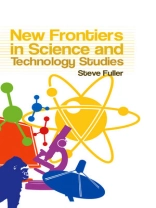Steve Fuller has a reputation for setting the terms of debate within science and technology studies. In his latest book, New Frontiers in Science and Technology Studies he charts the debates likely to be of relevance in the coming years.
* Should science and technology be treated as separate entities?
* What impact has globalization had on science and technology?
* Can science be clearly distinguished from other forms of knowledge?
* Does the politicization of science really matter?
* Is there a role for the social regulation of scientific inquiry?
* Should we be worried about research fraud?
These questions are explored by examining an array of historical, philosophical and contemporary sources. Attention is paid, for example, to the Bruno Latour’s The Politics of Nature as a model for science policy, as well as the global controversy surrounding Bjorn Lomborg’s The Sceptical Environmentalist, which led to the dismantling and re-establishment of the Danish national research ethics board.
New Frontiers in Science and Technology Studies will appeal strongly to scholars and advanced undergraduate and graduate students in courses concerned with the social dimensions of science and technology, and anyone who cares about the future of science.
विषयसूची
List of Tables and Boxes vi
Introduction 1
Part I: The Demarcation Problem 9
1 Science’s Need for Revolution 11
2 Science’s Need for Unity 53
Part II: The Democratization Problem 83
3 Contrasting Visions 85
4 The Politics of Science Journalism 128
5 So-called Research Ethics 145
Part III: The Transformation Problem 179
6 The Future of Humanity 181
7 The Future of Science and Technology Studies 205
Bibliography 218
Index 230
लेखक के बारे में
Steve Fuller is Professor of Sociology at the University of Warwick.












